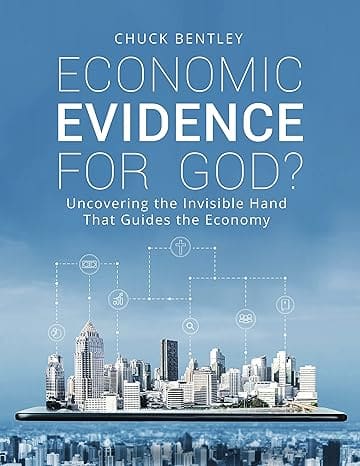
Chuck Bentley and Economic Evidence for God (Part 1)
 John Farrell: What is your role at Crown and what are you responsible for?
John Farrell: What is your role at Crown and what are you responsible for?
Chuck: I’m the CEO of Crown so I’m responsible for our global expansion for delivery of our mission. We serve to teach God’s people what the Bible says about money in more than a hundred countries. I oversee everything related to that. I also do two daily radio programs, write books, travel, speak, and grow the ministry.
John Farrell: Could you tell me a little bit about your newest book, Economic Evidence for God?
Chuck: I wrote the book because something began to converge in my mind that brought this topic of money and God together in a way that I felt like other people needed to see it. In 1999, I attended a Crown Bible Study and began to read and learn and immerse myself in what God says about money. That was new for me, but the experience was transformative, not only in my finances but in my relationship with my wife in my relationship to the Lord.
So, I began volunteering with Crown to teach other people what the Bible says about money. Soon after that I joined the staff and began increasing in responsibility. I became very passionate about spreading the training around the world and have had the privilege to travel to many countries to do that.
I began to notice that not only is the Word of God able to transform an individual life like mine, but also to transform nations. There was a strong correlation between nations that obeyed God’s principles and their economic growth. So, the book is about that journey and how other people can have that experience and begin to look at economics through a biblical lens instead of just a secular lens.
The Connection Between God’s Word and Financial Freedom
JF: Is that the overall message you hope readers take from your book?
Chuck: I hope they make the connection between God’s Word and their financial choices and can start to see the world through that very same lens. It makes so much sense to me now to see that economics is not separated from God’s Word. We can understand it when we know what God said we need to do and follow those principles or see the consequences of those who ignore them.
JF: What economic evidence is there that points to the reality of our God?
Chuck: I could give you a lot of examples of that. I always try to think of which one I would rather choose. I’ll give you one that’s very straightforward. If you take the 10 commandments listed in Exodus 20 and look at those through an economic filter, you see that any nation that abides by those principles or laws of God in Exodus experiences economic growth.
But if any of the 10 commandments are ignored, they experience economic pain. The Lord said that we’re to be faithful in marriage. We’re not to commit adultery. Well, countries where the culture upholds covenant marriage have the fastest-growing economies in the world. Cultures that ignore that have the slowest growing economies in the world and some of the greatest economic pain.
The same goes true for the commandment to not lie or the commandment not to murder. If those are ignored, then the economy suffers.
Our moral behavior is totally tied to economic growth; therefore, you can’t separate the two. Although many economists try to, the reality is that they’re joined together. To me, that points to the reality that God is there. His Word holds true whether it’s in our personal, what I call microeconomy, or on a national level at the macroeconomic scale.
Marriage and Economic Wealth
JF: How does monogamous marriage lend itself more to the creation of wealth than not being in a monogamous marriage?
Chuck: I’ll give you my insight there. Others have written about this that I think have some pretty deep understanding of it. First of all, there is such a thing called the “marriage premium.” The marriage premium is evidence that two are better than one. When two people work to solve a problem, they have a better outcome than just one person trying to solve that problem. And the marriage premium shows up on an individual basis.
When people get married, they tend to have a higher savings rate. They tend to have a higher net worth. They tend to have more income. In fact, it’s by a wide margin, not just two to one, but by a much wider margin. Marriage helps to improve your personal finances, and that’s totally contrary to what the world teaches.
The world teaches that there are alternatives to marriage that are better financially. I’ve heard people say that it’s too expensive to get married, or they can’t afford to get married, or they can’t afford to pay joint income tax. All of these are rationales that the data proves wrong. When you look at the marriage premium on an individual basis, you’re simply seeing that play out on a national scale. In a country where people are faithful in their marriage, you see better economic growth.
One simple answer is God designed it that way. You just have to stand back to answer the question, “Why?” to say, “Well, that’s the way God designed it.” He intended for that to work in our favor because He said it’s better. He created marriage and He said that it is good and the economics of it show that He is, in fact, correct.
JF: What other factors, outside of marriage, contribute to the wealth and economic growth in nations that worship God compared to countries that largely don’t worship the God of the Bible?
Chuck: If you look at the grid I created, I took the first commandment that we’re to love the Lord, our God, with all of our heart, mind, and soul. In other words, He said that He came to set us free, and that freedom is a result of His effort. He is the God that wants us to be free and anytime you see a culture that’s free to work, produce, and be creative, a free market begins to form, people begin to flourish, and you see massive economic growth.
One of the reasons that America is the wealthiest nation in the history of mankind, especially wealth created in such a short period of time, is because of freedom of religion. We were free to worship the God of the Bible and that led to free markets and that led to flourishing.
If you look at the rest of the nations of the world through that lens, you see situations where cultures see man as a small god. Anytime man sets himself up as a god to govern with absolute authority and control over the people, you see communism and atheism begin to develop. Those are command economies. Those are economies where the people are not free, they’re told what to do, when they can do it, and how much they can do of it. You see human capital abused. You see people enslaved, impoverished, and in a great deal of suffering under those models.
Then there are two others. You have the option to see government as god. If government becomes god in the minds of the people, you see socialism and humanism form, and those are centralized economies with very strong state control or state power. Those tend to underperform the free market economies. Then finally—what was fascinating to me—the fourth option is that idols are worshiped. In any culture of the world where idols are worshiped, you see a strong sense of mysticism, idolatry, oftentimes a monarchy where man is viewed as a king or some sort of special royalty, and massive poverty.
The key is freedom, and the Lord came to give man freedom so that we could experience the blessings of our work.
JF: In your opinion, what are the most important economic principles and promises found within the Bible?
Chuck: I think there’s a real challenge in picking just one, but I’ll give you one that is on my list. Number one is that man sees himself as a producer. We are sub-creators of the Great Creator. He created us in His image, He worked for six days, and He put us here to be fruitful and multiply.
When man sees himself as a producer, that’s what leads to an abundance of resources. Most of the doomsayers of the world who believe we’re going to run out of resources, or the world is overpopulated, have it backwards. They think man is only a consumer, but God made man to be a consumer as well as a producer, and we generally produce more than we can consume. When that happens, you see abundance. That’s the reason that we’ve seen massive population growth throughout the world. Where man is free to produce and free to be creative and fruitful and multiply you see an excess of resources, not a scarcity of resources. In fact, underpopulation is a greater risk to society today than overpopulation.
…
Order your copy of Economic Evidence for God?: Uncovering the Invisible Hand That Guides the Economy by Chuck Bentley
Trending Now
Sign up today for your Inspiration Today Daily Newsletter
Supercharge your faith and ignite your spirit. Find hope in God’s word. Receive your Inspiration Today newsletter now!
John Farrell
John Farrell serves as the Digital Content Manager at Inspiration Ministries, where he oversees the planning, organization, and management of website content to support the ministry's global digital outreach. With a strong background in writing and editorial strategy, John ensures that the articles, devotionals, and discipleship resources on Inspiration.org are accurate, engaging, and aligned with the ministry's mission.
John has authored more than 1,000 articles, press releases, and features for Inspiration Ministries, NASCAR, Lionel, and Speed Digital. His versatility as a writer is also showcased in his 2012 book, The Official NASCAR Trivia Book: With 1,001 Facts and Questions to Test Your Racing Knowledge.
A graduate of Appalachian State University, John brings excellence and attention to detail to the digital experience at Inspiration Ministries. He lives in Concord, N.C., with his wife and two sons.
Related Articles
January 29, 2026
5 Traits of Good Leadership
The traits of good leadership aren’t just about results—they’re about relationships. Servant…
December 9, 2025
End-of-Year Giving Benefits: Tax Savings, Legacy Gifts & Stewardship
As the year draws to a close, many believers take time to reflect on God’s goodness, their personal…
November 29, 2025
What Does the Bible Say About Finances?
Learn what the Bible teaches about money, giving, and contentment. Explore 10 scriptural principles…
November 20, 2025
Can You Smile at Your Future?
When you make the Lord your dwelling place amid life’s storms, you can rest confidently in His…
Next Steps To Strengthen Your Walk
Inspiration Today Newsletter
Supercharge your faith and ignite your spirit. Find hope in God’s word. Receive your Inspiration Today newsletter now!
Christian Articles
Find articles to strengthen your walk and grow your faith. We have a wide range of topics and authors for you.
Submit A Prayer Request
We are here for you. Simply click on the button below to reach us by form, email or phone. Together we will lift our hearts and voices with you in prayer.





